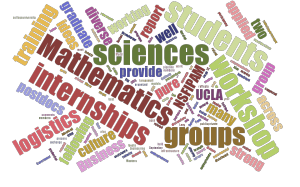2015 NSF-IPAM Mathematical Sciences Internship Workshop Report
SUMMARY RECOMMENDATIONS
This report reflects discussions and recommendation from the September 1-2, 2015 NSF-IPAM Mathematical Sciences Internship Workshop held at the Institute for Pure and Applied Mathematics (IPAM) at UCLA. The workshop was organized by Russel Caflisch, Mathematics, UCLA; Alan Lee, VP of Engineering, Advanced Micro Devices (AMD); Rachel Levy, Mathematics, Harvey Mudd College (facilitator) and James L Rosenberger, Statistics, Penn State. The diverse group of participants brought perspectives from academic (college/university, public/private), business (large/small) and governmental institutions as well as many areas of the mathematical sciences.
The goal of the two-day workshop was to discuss recommendations for infrastructure and programs that could:
• increase the number of internships targeting mathematical sciences students
• open the internship pipeline to a diverse group of students
• provide assistance with timing and logistics for undergraduates, graduate students and postdocs in pure and applied mathematics
• provide training to prepare mathematical sciences students for internships
• develop viable models of how internships best work for mathematical sciences students, postdocs and faculty and for industry/government
During the workshop participants spent two sessions in one of the following working groups: support, training, logistics, recruiting, culture. They also rotated to two other groups, participated in a charrette to respond to general questions, and provided comments in several all-group sessions. With the intentional overlap between topics and exchange between members of different groups, many ideas arose which resonated across the groups. This report represents central ideas that had strong support, as well as questions and considerations raised by the participants.
The following recommendations resonated across the working groups on support, training, logistics, recruiting, and culture. A target of 1000 graduate internships per year was suggested to meet the demand for internships arising from the strong production of Mathematics PhDs, and the large numbers of students pursuing BIG (Business, Industry, Government) careers after the undergraduate and Master’s levels. The recommendations are related as a distributed network, with different goals at each level.
Click here for the full report.






